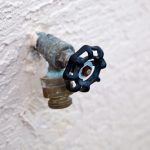Why Is The Water Slowly Coming Out Of My Faucet?
 Have you ever experienced the frustration of turning on your faucet only to find that the water is trickling out at a painfully slow rate? If so, you’re not alone. Many homeowners encounter this issue at some point, and it can be both annoying and concerning. In this blog post, we will explore some common reasons why the water may be flowing slowly from your faucet and discuss potential solutions.
Have you ever experienced the frustration of turning on your faucet only to find that the water is trickling out at a painfully slow rate? If so, you’re not alone. Many homeowners encounter this issue at some point, and it can be both annoying and concerning. In this blog post, we will explore some common reasons why the water may be flowing slowly from your faucet and discuss potential solutions.
1. Clogged or Dirty Aerators:
A common culprit behind slow water flow is a clogged or dirty aerator. An aerator is a small device attached to the end of the faucet that mixes air with the water, controlling the flow and reducing splashing. Over time, mineral deposits, sediment, and debris can accumulate in the aerator, obstructing the flow of water. To solve this problem, first, close the faucet tap and unscrew the aerator from the tip of the faucet. Rinse it thoroughly under running water to dislodge any debris or mineral deposits. If necessary, scrub the aerator with a brush to remove stubborn buildup. Once cleaned, reattach the aerator, and test the water flow.
2. Low Water Pressure:
Another common reason for slow water flow is low water pressure. Low water pressure can occur for various reasons, such as a partially closed water valve, a malfunctioning pressure regulator, or a water leak. To determine if low water pressure is the issue, check other faucets in your home. If multiple faucets are affected, it’s likely a systemic problem that may require the assistance of a plumber. However, if only one faucet exhibits slow water flow, the aerator might be clogged, or the supply line could be partially blocked. Proceed with cleaning the aerator as mentioned earlier. If that doesn’t resolve the issue, inspect the supply lines for any kinks or blockages that require attention.
3. Pipe Deposits or Corrosion:
Over time, mineral deposits, rust, and corrosion can accumulate inside the pipes, restricting the flow of water. This buildup often occurs in older plumbing systems or in areas with hard water. If you suspect this to be the cause of your slow water flow, you may need to call a professional plumber to assess the situation. They can provide remedies such as flushing out the pipes or applying descaling agents to remove the mineral deposits and restore the water flow.
4. Plumbing Obstructions:
Sometimes, the issue lies beyond the faucet or the supply lines. Hidden plumbing obstructions, such as pipe leaks, cracked pipes, or tree root intrusions, can hinder the water flow and cause slow water movement. These obstructions might be more challenging to identify and fix on your own. It’s best to reach out to a plumbing expert who can conduct a thorough evaluation of your plumbing system and recommend appropriate solutions to rectify the issue.
5. Municipal Water Supply Issues:
While less common, it’s worth considering that the issue might not be within your own plumbing system at all. Occasionally, the water utility company may experience maintenance or infrastructure problems that can affect water flow to your property. In such cases, the issue lies outside your control, and it’s best to contact your local water provider to inquire about any known or ongoing issues and estimated resolution time.
Summary
A slow water flow from your faucet can be a frustrating problem to deal with. By exploring possible causes such as clogged aerators, low water pressure, pipe deposits, plumbing obstructions, or municipal water supply issues, you can better understand the underlying reasons behind the slow flow. While some fixes can be done on your own, it’s important to seek professional help when necessary to ensure a proper diagnosis and resolution. Remember, a well-functioning faucet with a steady flow of water is essential for your daily activities, so don’t hesitate to address the issue promptly.
Got Questions About Your Faucet? Let Us Help!




